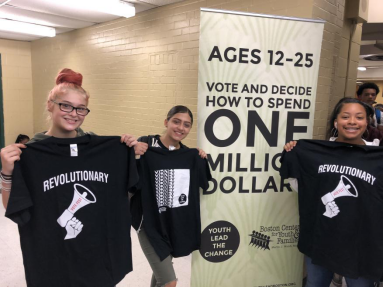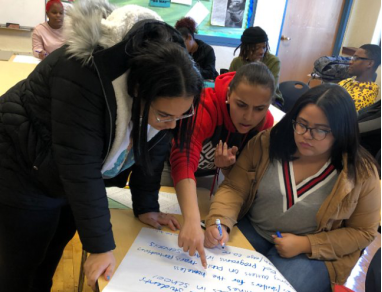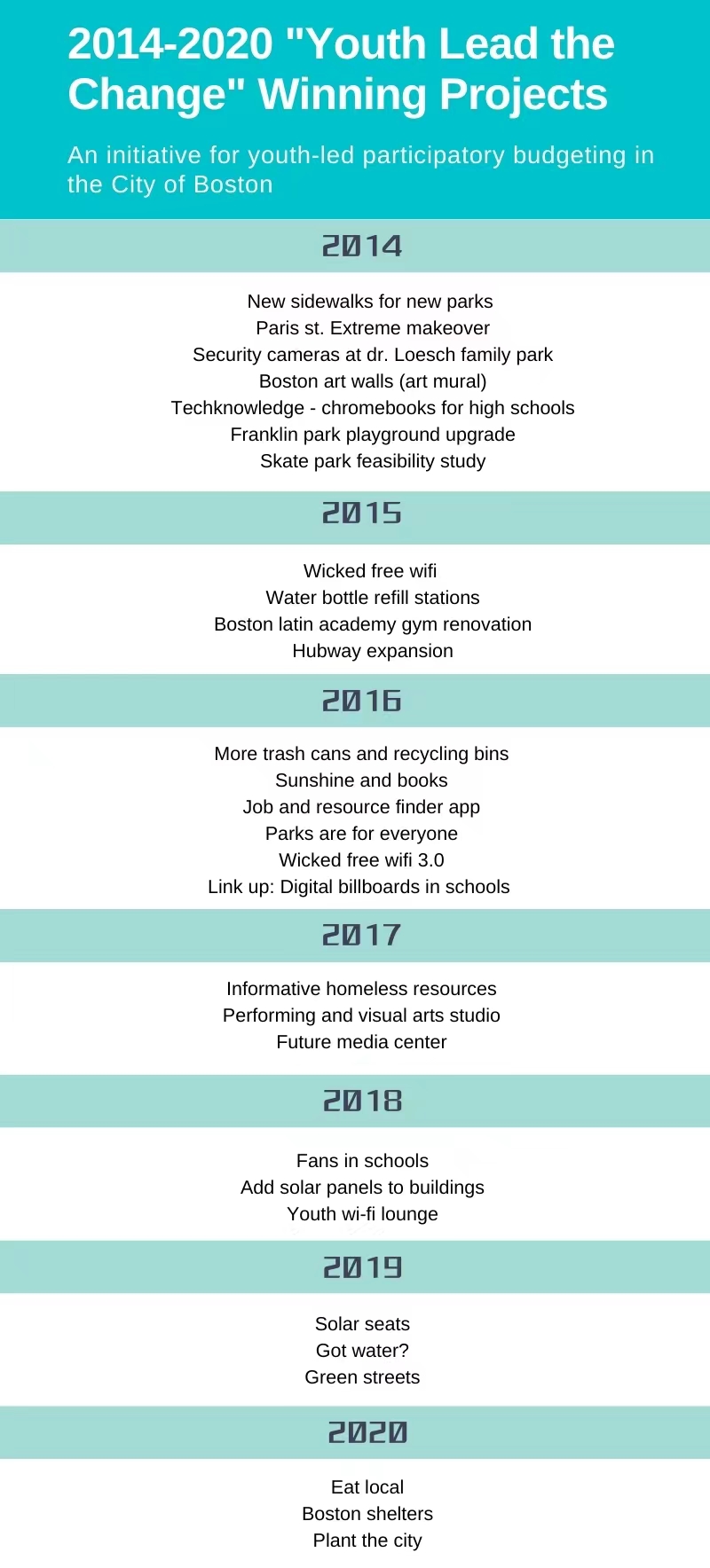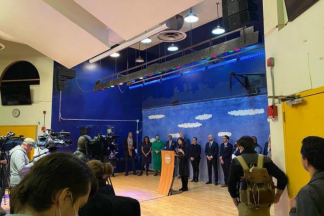Echo of Cities | Boston, United States: Youth Lead the Change
In 2016, Boston won the 3rd Guangzhou Award for its initiative "Youth Lead the Change: Youth Participatory Budgeting". The initiative empowers the youth to develop creative ideas for how to spend the dedicated funds and make the final decision, thereby strengthening their understanding of the city management and budgeting process and improving their leadership and professional skills.
After seven years, what outcomes the initiative has achieved? What impacts the project has made on young people? How has it inspired other cities? In this week’s Echo of Cities, let’s take a look at the Youth Participatory Budgeting project and learn how Boston has empowered youth to increase the vitality of urban governance, thereby improving livelihoods and achieving sustainable development.
About the Initiative: Empowering Youth to Participate in City Management
Given that young people are the future leaders of society, the then-mayor Martin Walsh has been committed to giving young people a voice and engaging them in the workings of government. Based on this background, 2014 witnessed the creation of the initiative “Youth Lead the Change: Youth Participatory Budgeting”, which has been designed to empower young people between the ages of 12 and 25 to decide how to spend $1 million of the city budget each year. The project has not only encouraged young people to participate in policy dialogue and city affairs but more importantly, fostered a lifelong commitment to local public engagement.
To move the project forward, Boston has formed a network of partners with youth-serving organizations, universities, and other educational institutions. The project initially organized a steering committee, whose members were primarily young people associated with youth-serving organizations. The committee has also operated to ensure that adults support young people and gave them development opportunities, and built targeted connections between young people and adults. Together with supportive adults, these young people have developed the governance rules and highlighted the voices of young people.

Picture:Young Bostonians are encouraged to submit ideas for “Youth Lead the Change”
From: Twitter @MYCBoston
In the first year of the initiative, 14 projects entered the final voting stage, and 7 projects were selected by the youth and supported by the budget, being practically applied to the process of city development.
The decision-making process has inspired young people to participate in community decision-making and enabled them to realize that they can change their communities. This has increased public participation in urban governance, facilitated communication between young people and the government, strengthened their trust in the government, and raised their awareness of the budget process and democratic decision-making process.

Picture: Students at Boston Community Leadership Academy are participating in “Youth Lead the Change”
From: Twitter @MYCBoston
Initiative Updates: Youth Leadership Stimulating the Urban Sustainable Development
After winning the Guangzhou Award, Boston has made many meaningful investments in youth-led projects. In its 7th year as of 2020, the project has made outstanding contributions to green and sustainable urban development, improving livelihoods, and promoting youth development.
For example, the PERFORMING AND VISUAL ARTS STUDIO program is both practical and artistic. The program allows young artists to legally create art in a specific space without facing consequences such as arrest or imprisonment. It also connects young artists to the community and provides a space for community building. Another example is the PLANT THE CITY program in 2020, which aims to beautify the city and respond to climate change by planting trees and other plants around Boston, especially along streets and sidewalks.
Other projects are meaningful to the improvement of urban governance and citizens' lives, such as the PARKS ARE FOR EVERYONE program. The young people involved in this program have given practical thought about how to make the city more accessible - not only for people with disabilities, but also for the community as a whole. In addition, they proposed Wi-Fi access in parts of the city frequently visited by young people and a mobile app to help them find jobs and employment opportunities.
“I think that’s an example of a really wonderful project that serves many different needs from promoting public safety to keeping youth out of the juvenile justice system to building a stronger sense of community. This is an example of young people being really smart and demonstrating their leadership and understanding of what it takes to create healthy communities”, Shari Davis, the then-executive director of the Department of Youth Engagement and Employment for the City of Boston said.

Table: programs voted on by youth between 2014-2020
Besides, the Boston government learned from past experiences to improve and optimize the program process, and further expand the reach of the population to promote diversity and innovation in the idea-gathering process.
In 2018, the program reached children as young as 12 years old and heard the voices of disenfranchised people such as homeless youth and gang youth in detention centers. This innovative practice has allowed the City to truly decentralize and provide positions and roles for young people. Over three years, youth investments in environmental and municipal infrastructure totaled approximately $2.86 million, and 17 projects were constructed. In 2019-2020, the “Youth Lead the Change” project revised its schedule to a two-year process. This allowed enough time to design, construct, and implement those winning projects. In this process, year one is dedicated to idea collection and voting on new projects, and the second year is focused on the implementation of those projects.
Meanwhile, on January 12, 2023, Boston Mayor Michelle Wu announced the creation of a new Office of Youth Engagement and Advancement (OYEA) within the Human Services Cabinet to further promote youth development and increase the engagement of youth and city staff. In addition to continuing to advance existing youth leadership and engagement project, the Office will be responsible for supporting the development, engagement, and empowerment of young people in the City of Boston. Specifically, OYEA will field a first-ever citywide survey of young people to learn more about the challenges and opportunities of youth in Boston and reinvigorate the annual Mayor’s Youth Summit. Building on the newly created office, the City of Boston also announced the grantees of the latest round of Youth Development Fund (YDF) -- totaling $1.5 million, which will be distributed to 60 youth-serving nonprofit organizations in Boston that serve young people ages 10-24. The Grants range from $2,000 to $60,000 to support a wide variety of programming including arts, leadership development, mentoring, sports, and entrepreneurship.

Picture: The Office of Youth Engagement & Advancement (OYEA) is established
From: Twitter@BOSTONOHS
The achievements of the project have also inspired other cities around the world. An example is the 5th Guangzhou Award‘s winning city, Vienna. It was inspired by Boston’s initiative and launched the "Werkstadt Junges Wien", the largest children and youth participation project in Vienna. The project involves all children and young people living and growing up in Vienna in the social decision-making process, allowing them to set their agenda and decide on priorities, putting them at the heart of policy-making and city management. By 2021, some 1,000 educators, youth workers, teachers, and volunteers had conducted 1,309 workshops for 22,581 children and youth, involving 70 departments and businesses across the city.
Overall, the "Youth Lead the Change: Youth Participatory Budgeting" project has not only increased public participation, raised youth awareness of the environment and urban infrastructure, promoted community development, driven economic growth, and contributed to urban planning, but has also served as a global reference for increasing youth leadership and engagement." Developing and supporting young people in our community is one of our most important responsibilities as a city." said Mayor Michelle Wu. In the future, Boston will continue to improve the process of the project, allowing more young people to participate in the project, and enhance their leadership and decision-making ability.
References
广州国际城市创新奖是什么?谁来评?评什么?这届广州奖 它们来竞逐(2021).腾讯网.https://new.qq.com/rain/a/20211109a029s300
美国波士顿(2016).广州国际城市创新奖.http://www.guangzhouaward.org/a/1126.html
ABOUT YOUTH LEAD THE CHANGE. City of Boston. https://www.boston.gov/departments/youth-engagement-and-advancement/youth-lead-change#:~:text=About%20Youth%20Lead%20the%20Change,-Youth%20Lead%20the&text=The%20YLC%20process%20is%20informed,be%20spent%20in%20their%20communities.
Shari Davis. ORGANIZINGENGAGEMENT. https://organizingengagement.org/interview/shari-davis/?
从$2,000到$60,000!市长宣布好消息!波士顿未来将更加强大!(2023).REDIAN新闻. https://redian.news/wxnews/222136
奥地利维也纳儿童和青年计划(2021).广州国际城市创新奖http://www.guangzhouaward.org/a/1330.html


 In Focus | World Cities Day: People-Centred Smart Cities
In Focus | World Cities Day: People-Centred Smart Cities City Stories | Fostering community resilience: A lifeline for the Central African Republic
City Stories | Fostering community resilience: A lifeline for the Central African Republic In Focus | Innovative Education, Empowering Futures
In Focus | Innovative Education, Empowering Futures




















 Tel: +86 020 3780 4434
Tel: +86 020 3780 4434 Email: info@guangzhouaward.org
Email: info@guangzhouaward.org Adress: Unit 01-7, 28th Floor, No. 7, Chunrong 3rd Road, Tianhe District, Guangzhou, Guangdong, 510000, PRC
Adress: Unit 01-7, 28th Floor, No. 7, Chunrong 3rd Road, Tianhe District, Guangzhou, Guangdong, 510000, PRC




